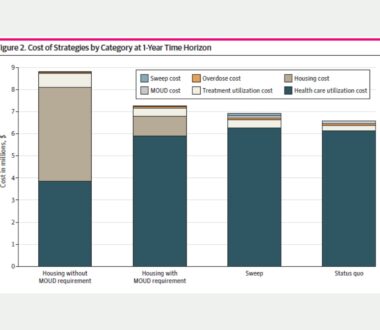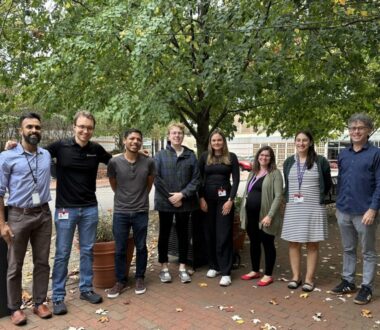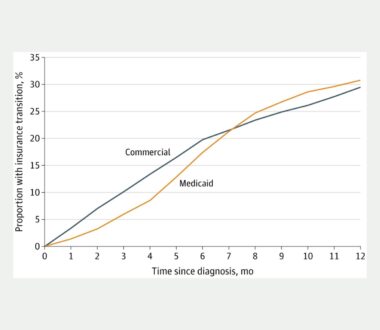
Pilot Grant Analysis Examines Prior Authorization Trends for MOUD in Private Insurance
There is a growing body of research illustrating a movement to remove prior authorization for medications for opioid use disorder (MOUD). Prior authorization requires providers to request approval from an insurer before providing a medication or service. This process is historically enforced for a wide range of medications, including certain MOUD, and has been found […]

Improving Substance Use Treatment Access in Criminal-legal Systems through JCOIN 2.0
On September 29, 2025, the Justice Community Overdose Innovation Network (JCOIN) kicked off Phase II of its new five-year cycle that represents an estimated $33 million in research investments in 2025. Awarded by the National Institute on Drug Abuse (NIDA) as part of the NIH HEAL Initiative, the investments help establish clinical research hubs and […]

Understanding the Costs of Using Implementation Facilitation to Implement Emergency Department-Initiated Buprenorphine
Buprenorphine, when prescribed in the emergency department (ED), increases the chances for treatment engagement and retention among patients with opioid use disorder (OUD). The patient uptake and clinical administration of ED-initiated buprenorphine for OUD, however, has been slow despite evidence of its effectiveness. Implementation facilitation (IF), a strategy that leverages external facilitators and a local […]

Health and Economic Outcomes of Addressing Encampments of Individuals Using Opioids
Lead author Hana Zwick, a research data analyst at the Syndemics Lab, and colleagues published a new simulation modeling study in JAMA Network Open to understand the public health and economic outcomes of strategies that arrest, disperse, or house people who live in encampments and experience high-risk opioid use compared to the encampment status quo. […]

New Rules for Methadone Doses at Home Did Not Increase Overdoses
Methadone is known as the gold standard treatment for opioid use disorder, with some experts calling it a “miracle drug” for its effectiveness in blocking the effects of other opioids and preventing withdrawal. Since 1972, its use has been limited to specialized opioid treatment programs, with patients required to travel to a clinic for daily dosing. This […]

Simulation Consultation: San Francisco Department of Public Health
The Syndemics Lab, led by CHERISH Population Data & Modeling Core Director Benjamin Linas, uses simulation models to investigate population-level outcomes, costs, and cost-effectiveness of interventions and care delivery models to treat HIV, hepatitis C virus (HCV), and substance use disorder. In addition to their core research, the Boston-based team collaborates with real-world decision-makers to […]

Offering Buprenorphine in Homeless Shelters in Massachusetts Projects Life- and Cost-saving Results
Overdose is the leading cause of death among people with opioid use disorder (OUD) who are experiencing homelessness. Innovative care models that meet this population outside of office-based settings can improve access to buprenorphine, a medication for treating OUD, and avert fatal overdoses. In this study, Avik Chatterjee, lead author and addiction specialist at Boston […]

A Cost-Effectiveness of Implementation Facilitation to Promote Emergency Department–Initiated Buprenorphine for Opioid Use Disorder
In the last eight years, emergency departments (EDs) have seen an influx of visits related to opioid use disorder (OUD). For the same reason, researchers have been citing EDs to be a critical setting and reachable moment for initiating OUD medications, the gold standard of care. Buprenorphine is advantageous as a low-barrier OUD treatment compared […]

Announcing the 10th Pilot Grant Cohort Advancing the Treatment of Substance Use Disorders, HCV, and HIV
CHERISH is excited to welcome a new pilot grant cohort for the 10th year. Spearheaded by CHERISH Pilot Grant Program Director Brandon Aden, the program is designed to help researchers gain familiarity with health economic evaluations, apply related methodologies to their pilot research, and build out the next stage of their careers. This year, CHERISH […]

Improving Care for Opioid Use Disorder in the Criminal-Legal System
Substance use disorders (SUD), and especially opioid use disorder (OUD), are prevalent within the criminal-legal system. Recently, there has been increased alignment of OUD care across the criminal-legal system with the patient-centered American Society of Addiction Medicine guidelines. Whether by choice or through legislation, carceral facilities are increasingly offering FDA-approved medications for OUD (MOUD), which […]

Insurance Instability for Patients with Opioid Use Disorder in the Year After Diagnosis
Access to health insurance is crucial to gaining the necessary diagnostic and therapeutic services to achieve and maintain good health. Insurance is especially necessary to access medications for opioid use disorder (MOUD) as the cost of MOUD can be a barrier to staying in treatment. If insurance coverage is disrupted, MOUD treatment may be more […]

Informing Evidence-Based Medicine for Opioid Use Disorder Using Pharmacoeconomic Studies
Since 2021, over 100,000 individuals have died each year from a drug overdose, with approximately 76 percent of those deaths involving opioids. As the US health care system contends with this growing health crisis, improved access to evidence-based medication treatment for opioid use disorder (OUD) is imperative. Pharmacoeconomics, a branch of health economics used to evaluate comparative clinical, person-centered, and economic outcomes […]
Engage with CHERISH
Submit a Consultation Request or Contact Us to learn more about how CHERISH can support your research or policy goals.